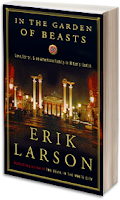I've been on a particularly lucky reading streak lately -- great book after great book after great book, with no clunkers. Most recently I read a memoir, The Chronology of Water by Lidia Yuknavitch, and a novel, State of Wonder by Ann Patchett; both were over-the-top terrific. I wasn't sure my luck would continue, but it sure did! Last night I finished reading Erik Larson's newest book, In the Garden of Beasts: Love, Terror, and an American Family in Hitler's Berlin, and I stayed up WAY too late finishing it because I just couldn't stop so close to the end.
Not that it should be surprising that an author can make Berlin under Hitler and the Nazis interesting reading. But what was surprising was that at well past midnight I found myself reading the end notes to the book, thinking "Sally, just stop reading and go to sleep, it's just end-notes, for goodness sake!" It's a rare writer who can make even the end-notes to a book compelling enough to keep one's eyes open in the wee hours.
Larson employs a great technique in telling the story of Berlin in the lead-up to WWII by telling the story of America's ambassador to Germany, William E. Dodd, and his flamboyant, flirtatious daughter, Martha. A mild-mannered professor of history from Chicago, Dodd moved to Berlin with his wife, son, and daughter as Hitler and his band of sadists and psychopaths rose to power.
Dodd's wife and son receive scant attention in the book (mostly because Dodd and Martha left a much greater written record of their thoughts and activities). His daughter Martha, newly separated from her husband, initially found the young men of the Third Reich handsome and exciting, and she threw herself into Berlin's social scene, having affairs and partying. But as proof of the evil intentions of the Nazis became increasingly obvious, she became repulsed, and Dodd became increasingly alarmed and tried to get the American government to step in, or at least speak up. But he is unsuccessful. Although he eventually recognized the dysfunction of the regime and behaved courageously, he was unable to persuade his countrymen to take action until it was too late, and war became inevitable.
Persecution of the Jews increased, as Hitler stripped them of basic rights and economic viability, and random sadistic violence reigned, culminating in the events of June 30, 1934 -- the Night of the Long Knives -- when Hitler ordered a political purge that resulted in the deaths of hundreds of his critics and rivals, many of them friends and acquaintances of the Dodds.
In the end matter to the book, Larson writes about how deeply his research into Nazi Germany affected him: "What I did not realize as I ventured into those dark days of Hitler's rule was how much the darkness would infiltrate my own soul. I generally pride myself on possessing a journalist's remove, the ability to mourn tragedy and at the same time appreciate its narrative power, but living among the Nazis day in, day out proved for me a uniquely trying experience" -- to the point that he had to keep one of his main reference books on Hitler face down on his desk so he wouldn't be forced to start each day with "those hate-filled eyes and slack cheeks and that fragment of Brillo that passed for a mustache" that had become so repulsive to him.
You also have to enjoy a writer who in his acknowledgements thanks his three daughters for "their increasingly astute critiques of my manner of dress" and his wife and "secret weapon" for her margin notes, "complete with crying faces and trailing lines of zzzzzz's...."
I recently read the novel Every Man Dies Alone, by Hans Fallada (who makes a cameo appearance in Larson's book), which is also set in Nazi Berlin and is based on true events. It was so horrifying -- and also un-put-down-able -- that I wasn't sure I was ready for another book on this bloody, sadistic, sorrowful period in our world history. But Larson is a extraordinarily good writer and story teller, and once I started I couldn't stop.
Larson is also the author of The Devil in the White City (about the 1893 Chicago World's Fair and a serial killer), Thunderstruck (about the invention of the wireless and the chase for one of Britain's most famous criminals), and Isaac's Storm (about the deadly hurricane off the Gulf Coast in 1900), among other books. He graduated summa cum laude from the University of Pennsylvania, where he studied Russian history, language and culture. He received a masters in journalism from Columbia University. He has been a staff writer for The Wall Street Journal and for Time Magazine and has written articles for The Atlantic, Harper’s, The New Yorker, and other publications. He and his wife and fashion-conscious daughters live in Seattle, where he owns an old British sports car named Mrs. Peel.
Tuesday, June 7, 2011
Subscribe to:
Post Comments (Atom)



No comments:
Post a Comment
Note: Only a member of this blog may post a comment.